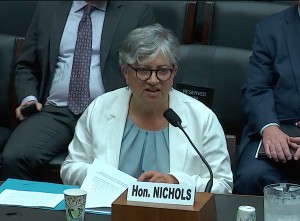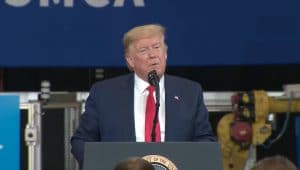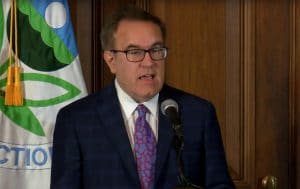
CARB’s Mary Nichols helped forge a deal with several automakers to implement tougher emissions standards in California.
Ignoring earlier threats from President Donald Trump, the California Air Resources Board and several major automakers finalized agreements that would have the company’s cutting vehicle emissions on vehicles in the Golden State.
The move comes in direct defiance of the Trump’s administration for lower emissions standards, claiming they will make the roads safer and save money for consumers. The automakers engaged in talks with California were subjected to an antitrust investigation by the Justice Department. No actions resulted from the probe.
The deal has Ford Motor Co., Volkswagen AG, Honda Motor Co., BMW AG and Volvo Cars agreeing to cuts that are more substantial than the 1.5% improvements required by the Trump administration. Those mandates changed the requirement implemented by the Obama administration, which pushed for a 5% improvement.
(Four automakers sidestep Trump, make fuel economy deal with CARB.)

The Trump administration ended an antitrust investigation involving four automakers and their deal with California to meet tougher standards.
The deal with CARB has vehicles getting “cleaner through 2026 at about the same rate as the former Obama-era program, preventing hundreds of millions of tons of greenhouse gas emissions over the lifetime of the agreements,” the organization noted.
“The framework agreements are voluntary commitments that support continued annual reductions of vehicle greenhouse gas emissions through the 2026 model year, encourage innovation to accelerate the transition to electric vehicles, provide industry the certainty needed to make investments and create jobs, and save consumers money,” officials added in a release.
While the deal mirrors the path for improvements laid out by the Obama administration, they are not as stringent — a happy middle ground. In addition to the emissions cuts, the automakers have also agreed to electric vehicle commitments.
(California regulators order massive shift to battery, hydrogen power for vans, trucks.)
The settlement agreements say California and automakers agreed to resolve “potential legal disputes concerning the authority of CARB.” The deal can be viewed as precedent setting as more than a dozen other states have adopted California’s standards.

EPA Admin Andrew Wheeler, a former coal-industry lobbyist, led the charge to remove California’s ability to set its own emissions and fuel economy standards.
These states joined together in a lawsuit – 23 in all – challenging the current administration’s emissions rules. The “final agreement will reduce emissions in our vehicles at a more stringent rate, support and incentivize the production of electrified products, and create regulatory certainty,” Ford officials noted.
While the deal does represent a significant move by automakers, there are several large automakers, including General Motors Co., Fiat Chrysler Automobiles N.V. and Toyota Motor Corp., that did not join the California agreement, saying they would adhere to the more lenient standards set forth by the president.
(West Coast group outlines plan for 1,300-mile EV charging corridor.)
Although the deal does put the automakers in a positive light, the bottom line also played a role in the move by at least automaker. “By setting these long-term, predictable, and achievable standards, we have the regulatory certainty that is necessary for long-term planning that will not only reduce greenhouse gas emissions but ultimately benefit consumers as well,” BMW officials told Reuters.

Automakers are just doing this so they do not get whipsawed if the low emission mandate comes back.
The current “SAFE” Act silliness will never pass the court challenge. It is based on seriously flawed data and logic and the administration’s missteps along the way will make it essentially indefensible. That said, the automakers who have made this deal are hoping that they can land some preferential treatment from California regulators, perhaps get a leg up on the competition and, I am betting, be in the driver’s seat in influencing what the incoming Biden Administration will do when it comes to CAFE and the California Clean Air mandate. It’s possible Biden will call for a direct return to the Obama-era rules, but he could build good will with the auto industry and environmentalists with some tweaks based on what CARB has done. Perhaps that will be used for a new, uniform national mandate.
Paul E.